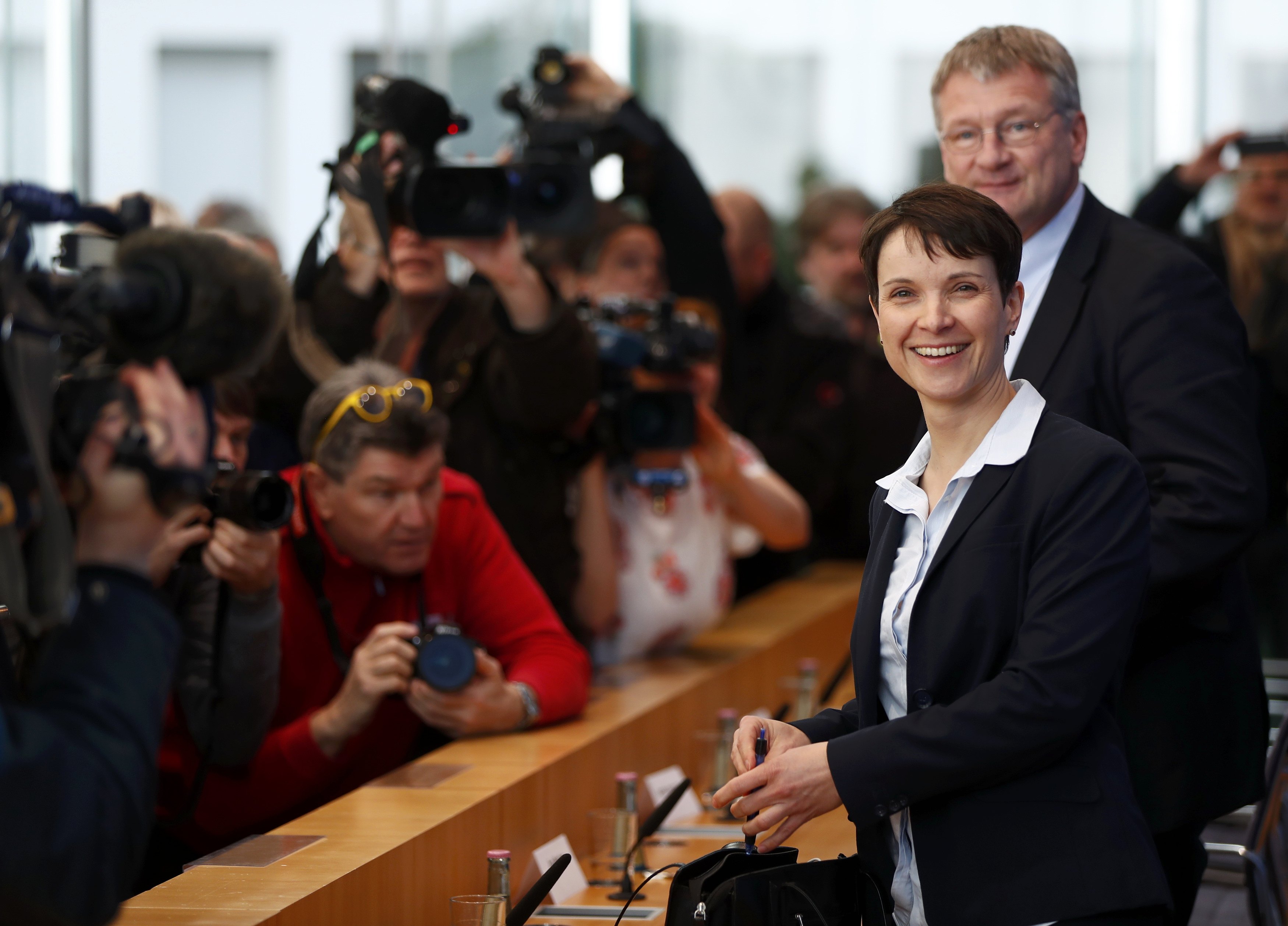
The outcome of Sunday's elections in three German states wasn't good for Chancellor Angela Merkel, but it also provided an example of how a well-balanced representative political system stops its Donald Trumps.
As in the US, much of the day-to-day life of people and businesses in Germany is governed at the state level. So while general elections matter a lot -- the next one is in 2017 -- the state ones determine how most voters will interact with government. On what the German press dubbed Super Sunday, three states with a combined population of about 13 million voted: Saxony-Anhalt in the former East Germany, Baden-Wuerttemberg and Rhineland-Palatinate in the west.
Only in Saxony-Anhalt did Merkel's center-right party, the Christian Democratic Union, win a plurality. In Baden-Wuerttemberg, home to Daimler, maker of Mercedes cars, the Green Party beat it. In Rhineland-Palatinate, Germany's top winemaking region -- and once home to the ancestors of Donald Trump -- the CDU was defeated by the center-left Social Democratic Party, its partner in the ruling federal coalition.
Everywhere, Merkel's party performed somewhat worse than in the previous election. Merkel pulled no punches about what Bild, Germany's most popular newspaper, called a "debacle."
"It was a hard night for the CDU," she said. "The refugee crisis was the dominant theme. In the eyes of the people, a solution has not been found."
That was her way of acknowledging the strong performance of the anti-immigrant, anti-European Union party Alternative fuer Deutschland. It failed to even get into parliament in 2013, but in Sunday's elections it won a shocking 24 per cent in Saxony-Anhalt, 15 per cent in Baden-Wuerttemberg and almost 13 per cent in Rhineland-Palatinate.
The AfD is Germany's Trump. Its leaders pride themselves on being politically incorrect, its supporters believe the political establishment is rotten, and their hatred for Merkel is a lot like that of Trump fans for Hillary Clinton.
Germany's continuing tidal wave of refugees is even more traumatic to people in many parts of Germany than illegal immigration is to Americans. In the east, people are used to living in all-white communities. The refugees from Syria, Iraq and Afghanistan, as well as the migrants from other Middle Eastern and North African nations who inevitably get mixed in with them, are more traumatised by their experiences of war and death-defying sea travel than the US immigrants from Latin America are by their journeys. They are also more culturally different from the local population.
So the AfD's rhetoric on immigrants is sometimes even more explosive than Trump's. One of the party leaders, Frauke Petry, suggested earlier this year that German police should shoot immigrants trying to cross into Germany illegally.
To complete the eerie resemblance to Trump, the AfD is getting Trump-like election results, drawing previous non-voters to the polls.
Yet within the German system, the danger of right-wing populism, now personified by the AfD, is better contained than within the US one. In none of the three states that held elections on Sunday will the AfD become part of the government. That's the advantage of parliamentary politics: Parties can choose coalition partners to gain a majority in the legislature.
Saxony-Anhalt was run by an SPD-CDU coalition not unlike the federal one. After the current election, they no longer have a majority together, but they will if they join forces with the Greens. In the other two states, the shape of the governing coalitions will also have to change, and they will be slightly to the right or slightly to the left of center depending on how the parties can agree with each other. No one, however, is going to invite the AfD. It's as much of a pariah to more responsible parties as Trump is to the other presidential candidates still in the US race.
This looks somewhat like the brokered Republican convention scenario under which the party establishment would conspire to keep Trump out. Yet it's more fair, because German politics is not winner-take-all. Those who voted for AfD will be adequately represented in the three states' legislatures. They will be able to propose laws that other parties will have to consider. If Trump is kept out despite his strong showing, he will have every right to get mad: The people he has inspired to get involved in the electoral process will feel swindled.
The architects and keepers of the US political system should own up to its inferiority. Saying it's as functional and representative as the European parliamentary systems is nothing but hubris: The US is caught between a right-wing populist laying a strong claim to the presidency and the undemocratic shenanigans that are being considered to stop him.
The surge in AfD support in Germany is forcing Merkel to redouble efforts to reduce the influx of immigrants; the evidence is in recent legislation making it more difficult for them to stay. In the US, too, Trump's run should make the political establishment look deeper into the causes of the discontent that has validated it. Yet in a winner-take-all system, where the checks and balances are limited to an unelected court and a legislative system in a state of constant electioneering, all that can ensue is more gridlock and more dissatisfaction from unrepresented voters. - Bloomberg View